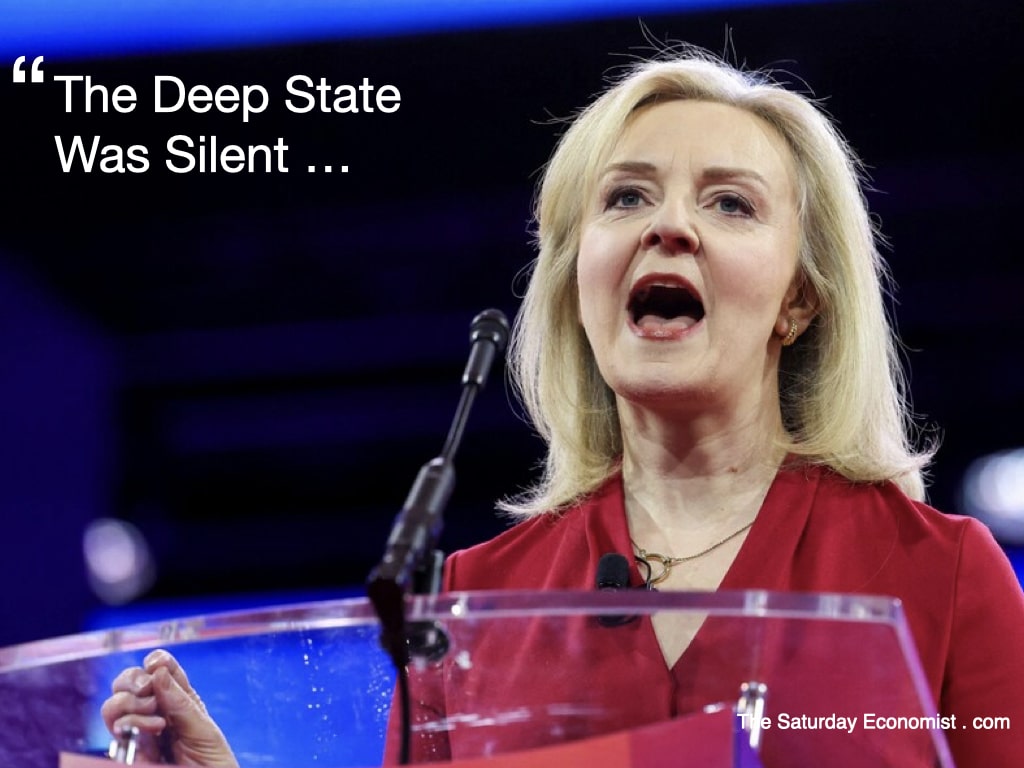|
Liz Truss complained, when ditched as Prime Minster, she had been "downed by the deep state". The Bank of England, the Office for Budget Responsibility, the International Monetary Fund, the Economist and the Financial Times were all, she claimed, part of the Deep State. A sinister left-wing cabal promoting something called "wokeonomics" and an anti growth agenda.
"We have to understand how deep the vested interests of the establishment are, how hard they will fight and how unfairly they will fight in order to get their way". "That is what I learnt from my time as a government minister and my time in No 10." [Obviously a quick learner.] This time, this budget, the deep state was silent. Or was it? According to Tom Peck in the Times on Friday, maybe the Institute of Fiscal Studies should be added to the Deep State Hit List. "The IFS post-budget briefing is where budgets traditionally go to die". Director, Paul Johnson, the Wonk King, stands up in front of the assembled wonks and nobly fulfills his role of national, post-budget, extractor fan. The smoke is sucked away. The mirrors smashed." Reality revealed. "Nothing that Jeremy Hunt did yesterday, changed anything," Paul Johnson said on Thursday "We are still heading for a parliament in which living standards will be worse at the start than at the end. That's pretty much unprecedented." Tax revenues are seen to rise to the highest level, as a share GDP, since 1948. Pensioners will be punished by the latest budget moves. Risks to borrowing from certain tax cuts now, are to be paid for by back loaded uncertain increases in the future. Spending plans are largely unspecified. Richard Hughes Director at the OBR has called Government spending plans a " work of fiction". "Some people call [the projections] a work of fiction, but that is probably being generous. At least someone has bothered to write a work of fiction, the government hasn't even bothered to write down what the departmental spending plans are", he said. The IFS claims, there would need to be at least £20 billion of spending cuts, for departments other than the ring fenced departments of, health, defence, education and child care. Where would they come from? This, will be a "staggeringly hard choice". "How do you make cuts, given NHS waiting lists, local authorities at or near bankruptcy, backlogs in the justice system, long-term cuts to university funding and struggles in social care and prison systems". The £20 billion plus savings from productivity improvements are ambitious. The inclusion of £5 billion revenue annually for energy hikes in the future, flies in the face of history. How do you make cuts? The answer is, you don't or can't. The staggeringly hard choice will almost certainly be somebody else's problem, given the next spending review will take place rather conveniently, after the next election. Some agree with Professor Philip Cowley and have signed up to his Campaign to Scrap the Budget. "Such occasions of parliamentary theatre, give governments an incentive to put short-term gimmicks above serious policy development". Short term gimmicks? Never! Yep, tough choices to be made but after the next election. It could be sooner than you think ...
0 Comments
Leave a Reply. |
The Saturday EconomistAuthorJohn Ashcroft publishes the Saturday Economist. Join the mailing list for updates on the UK and World Economy. Archives
July 2024
Categories
All
|
| The Saturday Economist |
The material is based upon information which we consider to be reliable but we do not represent that it is accurate or complete and it should not be relied upon as such. We accept no liability for errors, or omissions of opinion or fact. In particular, no reliance should be placed on the comments on trends in financial markets. The presentation should not be construed as the giving of investment advice.
|
The Saturday Economist, weekly updates on the UK economy.
Sign Up Now! Stay Up To Date! | Privacy Policy | Terms and Conditions | |

 RSS Feed
RSS Feed